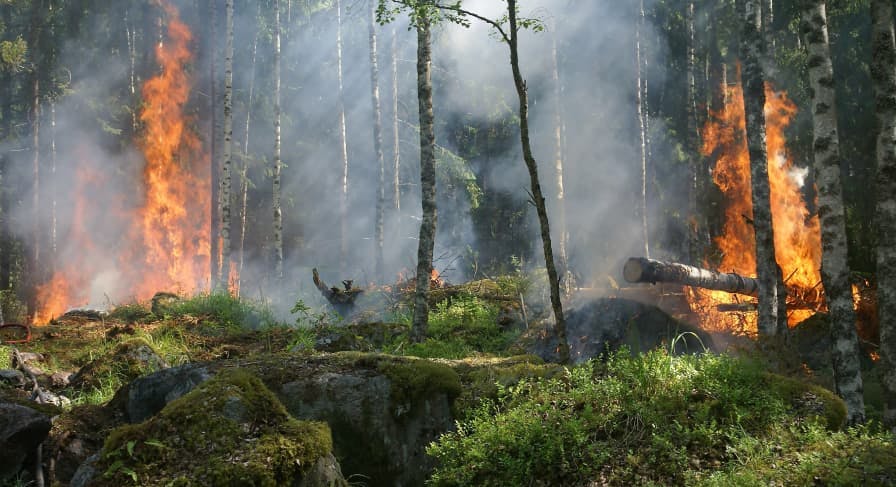
Sustainable Development Goals (SDGs): All You Need to Know
The United Nations has defined 17 goals, aimed at creating a better world. What are these so-called "Sustainable Development Goals" ? Explanations.
ESG / CSR
Industries



Finances are changing in nature due to climate change, with businesses opting to invest in ESG friendly funds, seeking impact or socially responsible investing, and even federal spending programs that are specifically designed to aid in the midst of the environment crisis.
However, what if climate change continued to hinder the current financial and federal spending programs currently in place meant to help ameliorate the current climate crisis? That’s what’s currently happening – and it could keep the U.S. from meeting their environmental targets on time.
How does climate change have an impact on current federal spending programs put in place by the Biden Administration, and how could climate change cancel out the efforts of other industries to improve other sectors of the economy at risk?
Federal spending programs are created by the federal government to allocate the spending of money on various products, goods, and services that can help Americans as well as the U.S. economy. For instance, the Inflation Reduction Act of 2022 serves as one of the biggest federal spending programs developed by the United States government to date – as it encourages tax reductions for Americans who opt to install renewable energy into their homes, purchase electric vehicles, or opt for energy efficient appliances. Federal spending programs will often benefit both Americans and the U.S. economy, as it can help to make life more affordable for Americans while also allowing for interest rates to be collected by the government.
👉 In the fiscal year of 2023 alone, the U.S. has already spent $2.46 trillion dollars to protect the well-being of Americans.
One of those federal spending programs being the Biden administration granting a whopping $550 million to the EJ TCGM. This federal spending program is designed to help provide the EJ TCGM, or the Environmental Justice Thriving Communities Grantmaking Program, to procure the funds necessary to give to grantmakers for various, beneficial environmental projects – such as for projects that aim to reduce pollution or develop new low-carbon technologies.
Federal spending programs are a big part of the economy in the United States, and while it is responsible for much of the debt the country subjects itself to – it ultimately helps cause-worthy programs across the nation get on their feet.

In March 2023, the Biden administration revealed how global warming will continue to impact the economy across the U.S., and most notably – through federal spending programs. This is mainly because the current climate crisis will force the U.S. government to re-evaluate how current funds are being allocated, and some of those federal spending programs are likely to take a hit if programs garnered towards climate change reform are in financial need.
Examples of federal spending programs that may need more financial attention in the midst of the climate change crisis include the agriculture sector or the insurance industry – both of which have taken a hit in the midst of drastic weather conditions have impacted the amount of produce farmers are able to grow, and with natural disasters such as heatwaves, wildfires, and droughts, insurance companies have been burdened with finding the funds to help people rebuild entire houses. This amount of spending was not required on behalf of industries such as insurance companies before the climate crisis got out of hand to where it is now.
In addition to this, the White House Council of Economic Advisers has also stated that current federal policies in place could continue to allow Americans to live in areas that are prone to the effects of climate change – such as in California, where forest fires are anything but obsolete, or states that reside close to the Great Salt Lake where air quality is impacting the health of Americans. In short, continuing to allow these devastating impacts could also result in raised costs for both individuals, businesses, and health or insurance companies across the country – leaving less money to develop federal spending programs.

Currently, Biden has several federal spending programs in place – some that have only been proposed and have yet to come to full fruition, but could very well be impacted by climate change and a subsequent lack of funds. For instance, Biden has proposed almost $7 trillion dollars to help various social programs across the country and prevent future budget deficits, such as with federal spending programs for recapturing a centrist identity and to specifically lower deficit spending. The latter can be accomplished through federal spending programs that focus on taxing large businesses and individuals with higher incomes, but this is one of the many federal spending programs that are likely to take a hit if climate change continues to deplete the current financial reserves on behalf of the U.S. government to rectifying negative events that have occurred due to climate change.
There are other federal spending programs that have been mentioned by Biden that may be put on the back burner due to climate change, such as the Biden administration’s plans to allocate over $1 billion dollars to the New York transit system. Ironically, a federal spending program such as this one could help to improve public transportation and overall help states like New York to decrease their carbon footprint and aid in the battle against climate change itself.
These are just a few of the federal spending programs that could take off slower than expected due to climate change, but the problem that remains most pivotal to the future of these federal spending programs is that climate change continues to change the price values and risks of conducting these projects at any given moment’s notice – meaning that almost any and all federal spending programs could be impacted by climate change.

As explained by the Intergovernmental Panel on Climate Change, human activities are the main reason for the extreme raise in global temperatures – meaning the only surefire way to reduce emissions, and ultimately protect current federal spending programs from the impacts of climate change, is for humans to alter their behavior.
One of the best ways to protect future federal spending programs would be by implementing better regulation, such as by altering the current manner in which insurances companies are equipped to handle the increasing amount of annual natural disasters. Helping to allocate the proper amount of money from the government could prevent the need to overpay for repairs necessary due to natural disasters caused by climate change, and ultimately allow for more federal spending programs in the future to take flight.
👉 Think of the solution to protect current federal spending programs in a similar way to a savings account versus a checking account. If the federal government creates financial reserves, similar to a savings account, for insurance industries to more adequately take care of those in need of repairs due to natural disasters – the available funds meant to go to future federal spending programs will not be affected due to climate change.

Another way to mitigate the impact of climate change on federal spending programs is for entities across the U.S. to develop improved risk management tactics in order to help financial markets better mitigate the financial repercussions of climate change. For instance, the government could impose a universal climate adaptation strategy for the financial market or stress the importance of better policies to be established by state and local officials. If local governments set stricter rules on where people can buy property and build their houses, it could help to prevent more home insurance disasters – as they can avoid people from settling down in areas the most susceptible to climate change.
This would help to shine light on a continuous issue: that most real estate is desired alongside coasts or in isolated areas such as in mountain areas – which can be prone to flooding and forest fires alike. It is ultimately up to government officials to control the vulnerability of these real estate locations.
Are federal spending programs the only thought of concern to be had regarding how climate change can have an impact on financial and federal activities?
The problem with climate change is that it isn’t just going to cause trouble for current and future federal spending programs, but for the federal government as a whole.
The Biden administration has spent countless hours developing new climate policies and federal spending programs to help the country meet its environmental targets, which leave half of the country very dissatisfied and doesn’t reserve much room for the country to tackle other issues. In other words, the U.S. government will continue to be preoccupied with rectifying the current climate crisis before being able to dedicate full attention to other controversial issues occurring across the country.
One of the best solutions for the U.S. government to prevent spending too much time on rectifying current environmental predicaments or constantly adjusting or repealing current climate legislation is to develop a system to better identify the appropriate measures necessary for each climate situation on hand. This will help the U.S. government from spending too much money to fix issues in the future, and allow for more money to be spent on federal spending programs in the future.
Overall, climate change is putting stress on both the local and federal government – as it is putting time constraints on how quickly and effectively these governments can instill action to prevent future chaos due to climate change. It is important to remain aware that both our well-being, and efforts such as federal spending programs, will remain threatened as long as climate change persists.
If reading this article about federal spending programs and how climate change could impact their future prosperity has made you interested in reducing your carbon emissions to further fight against climate change – Greenly can help you!
The federal spending programs, many of which aim to help environmental policies and combat climate change. Check out our legislation tracker here to see which rules your company has to adhere to.
Greenly can help you make an environmental change for the better, starting with a carbon footprint assessment to know how much carbon emissions your company produces.
Click here to learn more about Greenly and how we can help you reduce your carbon footprint.
Greenly can help you make an environmental change for the better, starting with a carbon footprint assessment to know how much carbon emissions your company produces.